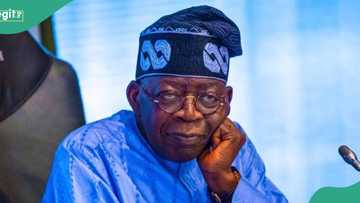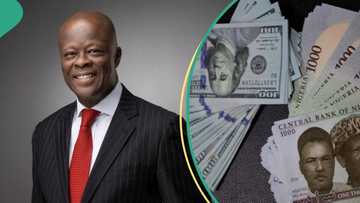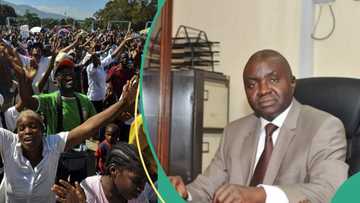"They Are the Problem": Bureau de Change Operators Knocked for Dollar Scarcity, Naira Decline
John Aloma, a financial expert, has blamed Nigeria's Bureau de Change (BDCs) operators for the forex crisis in the country.
PAY ATTENTION: Click “See First” under the “Following” tab to see Legit.ng News on your Facebook News Feed!
Aloma is a financial market analyst at Sympa Partners, an investment firm.
The expert said bureau de change operators, also known as black marketers, are responsible for the continued downward pressure on Nigeria's FX rates.
In the last few years, the Central Bank of Nigeria (CBN) under Godwin Emefiele has been battling to save the naira from further depreciation by initiating several policies.
Despite these efforts, the Nigerian currency has refused to stabilise, continuing its downward slide when measured against other global currencies, especially the United States dollar.
In the early hours of Thursday, September 22, 2023, the dollar exchanged for between N1,000 and N1,050 in the black market but finally settled at N990 later that evening.

Read also
N1,235 per £1: Naira weakens against foreign currencies as CBN fails on promise to clear FX backlog
On the same day, in the Investors & Exporters FX window, the naira closed at N738, marking a N252 disparity between the official and parallel market rates.
PAY ATTENTION: Follow us on Instagram - get the most important news directly in your favourite app!

Source: Getty Images
The role of BDCs in the scheme of things
The significance of BDCs in the Nigerian forex market cannot be overstated.
On a global scale, the best practice for BDCs involves operating as formal institutions, licensed by the CBN and operating within defined guidelines.
The primary function of BDCs is to address the foreign exchange needs of individuals and small to medium-sized enterprises (SMEs).
Their widespread presence and accessibility give them a competitive advantage that traditional banks do not possess.
They ensure accessibility in the forex market, provide valuable data for monetary policy formulation, serve as channels for the Central Bank of Nigeria's interventions in the retail forex market, and create employment opportunities, with over 15,000 jobs being generated.

Read also
Naira fall, dollar supply top CPPE's 10-point agenda for acting CBN governor Olayemi Cardoso
In Nigeria, however, some BDC operators have blatantly disregarded these guidelines.
Illegal activities of BDCs hurt the naira
Speaking with Legit.ng, Aloma claims BDCs further complicate the forex crisis in the country by hoarding and indiscriminately hiking the exchange rates in their favour.
He said the BDCs have abandoned their original objective, which was to serve retail end users who need $5,000 or less, and instead, they have become wholesale dealers.
He added that rather than pursuing legitimate avenues, they have transitioned into acting as wholesale traders, engaging in unauthorised foreign exchange transactions valued at millions of dollars per deal.
He said:
We can not talk about the crisis in the forex market without mentioning the activities of the bureau de change operators. They are partly the problem.
As much as they have their positive roles to play in the system, we can not deny that many of them have been quite mischievous with how they manage and distribute foreign exchange.
Aloma also accused the BDCs of hoarding forex to make it more scarce and increase demand so that they can sell at higher prices to customers whose demands are not being met by the banks.
He said:
BDCs have been found to sometimes hoard forex in other to make it scarce with the intention to sell at higher prices. In such cases, buyers are forced to pay for high prices, a simple case of demand and supply dynamics.
Aloma recalled that the illegal activities of the BDCs were what made the CBN to ban the sale of forex to them.
He said:
At some point, when the CBN got fed up with their dubious activities, it had to intervene by discontinuing the sale of forex to the Bureau de Change operators in Nigeria. Whether that decision by the CBN turned out for the better or worse is a discussion for another day.

Read also
FG’s economic plans in ruins as naira breaks record against the dollar in the parallel market
A fight for the new CBN governor and Finance Minister
Speaking on the way forward, Aloma expressed his confidence in President Bola Tinubu's choices for Finance Minister and CBN governor.
He said by their track records, the individuals have what it takes to stir Nigeria's financial system in the right direction.
He said:
The appointment of Wale Edun as Minister of Finance and the nomination of Yemi Cardoso as CBN governor by President Tinubu delights me.
If you look at their track record, you will see that Cardoso has an impressive track record in policy development and execution, and Edun is experienced in economics, banking and international finance.
In my humble opinion, I believe they have the experience and skill to do what needs to be done to deliver Nigeria from this financial quagmire.
What to expect in the coming months
Aloma also noted that aside from the activities of BDCs, the devaluation of the naira was further amplified due to the incapability of Nigerian banks to satisfy the increasing demand for US dollars, which in turn compelled buyers to resort to the unofficial market.

Read also
Parallex Bank challenges Access, GTB, Zenith, UBA, other banks for customers, makes promises
Stears Africa FX Monitor earlier forecasted that naira's instability will continue in the near future, with unofficial exchange rates potentially reaching as high as N985 per US dollar in the short run.
He highlighted the prior CBN administration's effort to dismantle all partitions by instituting a unified free-floating exchange rate and merging all foreign exchange platforms into the Importer and Exporter window.
To curb some of the illegal activities of the BDCs and sanitise their operations, Aloma enjoined the CBN to establish a platform to monitor their activities for transparency.
He said:
A potential remedy could involve BDC operators establishing a transparent exchange platform where their transactions can be recorded and pricing determined. This mirrors the operational model of global exchanges, particularly in foreign exchange.
BDCs explain role of politicians, wealthy Nigerians in naira fall
In an earlier report by the CBN, the Association of Bureaux De Change Operators of Nigeria (ABCON) blamed politicians and affluent Nigerians as major factors contributing to the naira's weak performance in the foreign exchange markets.
Aminu Gwadabe, the President of ABCON, told Legit.ng that the forex market's pressure is primarily instigated by speculators who are capitalising on the elevated exchange rates.
He urged the Central Bank of Nigeria to display a heightened interest in and scrutinise the demands within the market.
Source: Legit.ng




